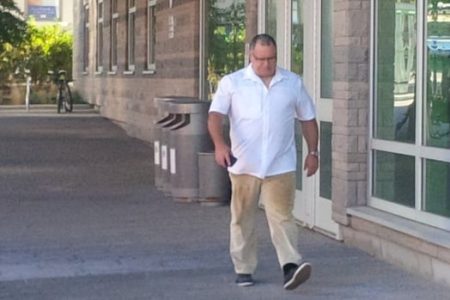WARNING: This story contains details of sexual assault and may affect those who have experienced sexual violence or know someone affected by it.
The man found guilty of the 1981 sexual assault and murder of a Hamilton nursing assistant has suddenly abandoned his bid for early parole, just two days into what was expected to be a three-week hearing.
“This was a rare and unexpected turn of events,” Crown lawyer Cheryl Gzik told CBC Hamilton in an email on Wednesday.
Robert Badgerow, who had four trials before his 2016 conviction in 23-year-old Diane Werendowicz’s death, received the mandatory sentence of life in prison with no chance of parole for 25 years. Normally, he wouldn’t have been allowed to apply until 2032.
The 66-year-old asked for early parole by requesting a judicial review of his sentence under the Criminal Code’s Faint Hope Clause.
A 12-person jury began hearing his application in Ontario’s Superior Court of Justice in Hamilton on Monday.
Gzik, who prosecuted Badgerow in 2016 in Kitchener, said Wednesday the convicted murderer had abandoned his application to attempt early parole and the jury was discharged.
“This may impact his ability to go for early parole in the future, and Robert Badgerow understands that,” she said, adding no formal reason for abandoning the court effort had been given.
Badgerow’s defence team declined to comment to CBC Hamilton.
Badgerow was the first person in Canadian legal history to be tried for the same murder four times.
His legal proceedings include multiple appeals and mistrials.
The jury in his early parole attempt this week would have decided if Badgerow would be allowed to apply for early release after the Crown and defence made their cases about his character, conduct in prison, nature of the crime and lasting impact on Werendowicz’s family.
Badgerow was expected to testify.
The Faint Hope Clause was repealed in 2011, but remains an option for people serving sentences for murder committed before Dec. 2 of that year.
Victim’s nephew describes trauma of prolonged court processes
When asked if she had heard from Werendowicz’s family about the outcome, Gzik pointed to a 2023 victim impact statement by her nephew.
“Robert Badgerow was privileged to live a life and enjoy all that it had to offer without consequences until 18 years later from the time he murdered my aunt,” it read.
Badgerow’s attempt to regain his freedom caused Werendowicz’s nephew to experience “grief, mental anguish, anxiety and frustration,” he wrote, “which in turn has caused me to relive this murder over and over again, giving me over a 40-year sentence in my own life while Robert Badgerow has only served 15 years.”
In court on Monday, Gzik told jurors that Badgerow is a “wolf in sheep’s clothing” who should not be given a chance for an early release.
“Robert Badgerow is deceitful, hasn’t shown any remorse or insight into his behaviour and denies the offence,” Gzik said.
Defence lawyer Aditi Iyer told the jury that Badgerow maintains his innocence.
Badgerow sexually assaulted and killed Werendowicz in a ravine after encountering her walking home from a Stoney Creek bar, Gzik said Monday.
Children found her body the next day, but it was not until 1998 that investigators linked Badgerow to the scene by extracting DNA collected from semen on Werendowicz’s body and jeans, and matching it to Badgerow’s.
He claimed he and Werendowicz had consensual sex in his car and someone else killed her later.
For anyone who has been sexually assaulted, there is support available through crisis lines and local support services via the Ending Violence Association of Canada database.

